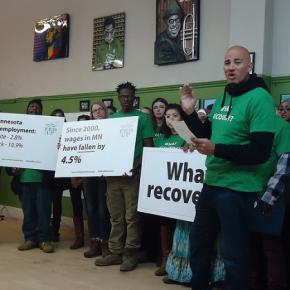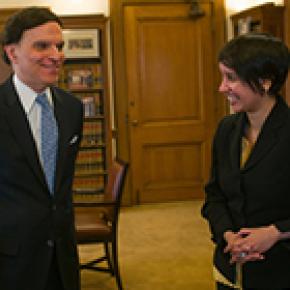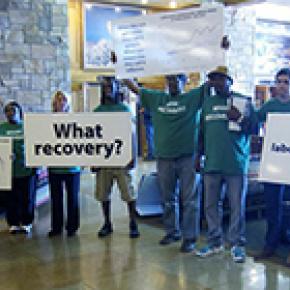It’s Not Just Low Pay Stressing Out Part-Time Workers
Bill Moyers - July 24, 2014, by Neha Tara Mehta - Besides struggling to make ends meet because of low wages, millions...
Bill Moyers - July 24, 2014, by Neha Tara Mehta - Besides struggling to make ends meet because of low wages, millions of part-time workers in America also face uncertainty over when they will be called in to work. Irregular schedules and last-minute notice make it hard for these workers to find other work, go to school and make arrangements for child care or caring for aging parents.
As The New York Times reported last week:
About 27.4 million Americans work part time. The number of those part-timers who would prefer to work full time has nearly doubled since 2007, to 7.5 million. According to Bureau of Labor Statistics data, 47 percent of part-time hourly workers ages 26 to 32 receive a week or less of advance notice for their schedule.
In a study of the data, two University of Chicago professors found that employers dictated the work schedules for about half of young adults, without their input. For part-time workers, schedules on average fluctuated from 17 to 28 hours a week.
“Frontline managers face pressure to keep costs down, but they really don’t have much control over wages or benefits,” said Susan J. Lambert, a University of Chicago professor who interpreted the data. “What they have control over is employee hours.”
According to the National Women’s Law Center, food service workers experience a 70 percent average variation of work hours every month. For retail workers, the variation is 50 percent and for janitors and housekeepers, it’s 40 percent.
Lawmakers across the country are beginning to notice how irregular schedules complicate the lives of part-time workers, and are taking measures to address the problem. Employees of federal agencies now have the right to request work schedule flexibilities. Workers in San Francisco and Vermont can ask for a more flexible or predictable work schedule. In a report released in June, New York City comptroller Scott M. Stringer made a case for a legislation that would give employees the chance to make such requests “without fear of reprisal.”
Congress is swinging into action on this issue as well. On Tuesday, Representatives George Miller and Rosa DeLauro introduced the Schedules That Work Act. Miller admits that the bill may meet with opposition, but thinks that it will highlight “often callous scheduling practices.”
The Guardian reports that another version of the bill is brewing in the Senate:
Senators Tom Harkin and Elizabeth Warren are co-sponsoring of the Senate’s version of the bill. Carrie Gleason, co-founder of Retail Action Project, said [that] Warren will introduce the Senate version in upcoming weeks.
A single mom working two jobs should know if her hours are being canceled before she arranges for daycare and drives halfway across town to show up at work,” said Warren. “This is about some basic fairness in work scheduling so that both employees and employers have more certainty and can get the job done.”
Although some businesses are saying the bills would represent government overreach, the clothing store Zara has already promised to start giving its part-time employees two weeks notice on their work schedules.
Source
Sex assault survivor who confronted Jeff Flake speaks out
A sex assault survivor who confronted Sen. Jeff Flake inside an elevator Friday — after announcing he would vote in...
A sex assault survivor who confronted Sen. Jeff Flake inside an elevator Friday — after announcing he would vote in favor of Supreme Court nominee Brett Kavanaugh — said that the likely pivotal moment “was all kind of a blur.”
Read the full article here.
The End of On-Call Scheduling?
Retailers have been ...
Retailers have been under intense pressure from labor groups, regulators, and their own employees to end on-call scheduling—the practice in which shift workers are called to work on short notice, and are often uncompensated if it turns out to be a slow day. On Friday, New York attorney-general Eric Schneiderman’s office announced that J.Crew will end on-call scheduling nationwide this month. The retailer joins Urban Outfitters, Abercrombie & Fitch, Bath & Body Works, Gap, and Victoria’s Secret, which all have announced changes since Schneiderman’s office launched an inquiry into the practice at over a dozen companies.
“After discussion with my office, J. Crew has agreed to end on-call shifts nationwide and to provide one week of advance notice about schedules to employees at all New York store locations,” said Schneiderman in a statement. “Workers deserve protections that allow them to have a reliable schedule in order to arrange for transportation to work, to accommodate child-care needs, and to budget their family finances.”
This is the sixth agreement Schneiderman has reached with a major retailer. In April, the New York attorney-general’s office sent letters to 13 retailers asking for information regarding their scheduling policies: “We have been informed that a number of companies in New York State utilize on-call shifts and require employees to report in some manner, whether by phone, text message, or email, before the designated shift in order to learn whether their services are ultimately needed on-site that day,” said the letter.
The letter expresses concern that the practice might be in violation of a state regulation that employees who report for work must be paid for at least four hours (or the number of hours in a regular shift) of work. It cites the financial and personal strains for workers without predictable schedules—from being unable to work another job or attend school, to the strains of finding childcare last minute. Further, a report by the Economic Policy Institute found that the lowest income workers face the most irregular work schedules.
A spokesperson for Gap Inc. confirmed that all five brands—The Gap, Banana Republic, Old Navy, Intermix, and Athleta—has phased out on-call scheduling globally by the end of September.* L Brand—the parent company for Victoria’s Secret and Bath & Body Works—also confirmed that they have ended the practice nationwide.
Gap is also working on a pilot project with Joan Williams, a professor and director of the Center for WorkLife Law at the University of California Hastings College of Law, and Susan Lambert, a professor at the University of Chicago who studies scheduling issues, on new ways to stabilize worker schedules. Lambert’s researchfound that 64 percent of food-service workers and half of retail workers receive less than a week’s notice for shifts.
For now, the shift away from on-call scheduling seems to be only gaining momentum: Earlier this week, Forever 21 was hit with a lawsuit from a former employee over unpaid on-call scheduling. And, for the seven remaining companies that Schneiderman’s office contacted (the identities of which are unknown), such momentum may soon be overpowering.
Source: The Atlantic
Blacks Nearly Four Times More Likely Than Whites to Be Unemployed in Minnesota
Minneapolis City Pages - March 6, 2015, by Ben Johnson - A new study reaffirms a refrain equality advocates have become...
Minneapolis City Pages - March 6, 2015, by Ben Johnson - A new study reaffirms a refrain equality advocates have become quite fond of in this state: Minnesota is a great place to live -- for white people.
The Center for Popular Democracy and the Economic Policy Institute released a study yesterday showing the statewide unemployment rate for black people is 11.7 percent, compared to 3.2 percent for white people.
Black Minnesotans' unemployment rate is 3.7 times higher than white Minnesotans'. The study analyzed all 50 states and the District of Columbia, and the only places with a larger gap were Wisconsin (4.6 times higher) and D.C. (5.6 times higher).
Minneapolis unemployment rates are lower than statewide, but the racial gap (3.9x) is even higher.
When these figures came out yesterday protesters from across the country lobbied the Federal Reserve to keep its interest rates low.
When interest rates are low it's easier for businesses to borrow money, and in theory, easier access to money means businesses can hire -- and pay -- more people. On the flip side, if interest rates are kept too low for too long inflation becomes a concern.
"Unemployment is slowly, slowly heading in the right direction, but raising interest rates at this point would really set minorities back," said Becky Dernbach with Neighborhoods Organizing for Change, which held a rally yesterday at its headquarters. "We think the Fed needs to pay special consideration to how the recovery has not hit certain communities at all."
NOC and its allies are supportive of Minneapolis Fed President Narayana Kocherlakota, who favors keeping interest rates low, but he's stepping down in a year. Protesters made it clear yesterday they want a say in who takes his place.
"On a fundamental level, we need to have a voice in the process," said Dernbach.
Source
Elizabeth Warren, Workers Take Aim at ‘Walmart Economy’
RH Reality Check - November 19, 2014, by Emily Crockett - When Sen. Elizabeth Warren (D-MA) and Rep. George Miller (D-...
RH Reality Check - November 19, 2014, by Emily Crockett - When Sen. Elizabeth Warren (D-MA) and Rep. George Miller (D-CA) invited Walmart workers to brief Congress on Tuesday about the retail giant’s abusive practices, the conversation was about more than just Walmart.
“No one in this country should work full-time and still live in poverty,” Warren said.
“This is about the simple dignity of the people you have hired to work,” Miller said. “When you have a higher minimum wage, fair scheduling, and equal work for equal pay, the perception of the business goes up in the people’s mind, the customers go up and the revenues go up.”
Cantare Duvant, a Walmart customer service manager, said at the briefing that since Walmart is the nation’s largest retailer, it sets the standard for others in the industry. “So not only do we as Walmart workers deserve better, our economy also deserves better,” she said.
Duvant is a member of OUR Walmart (Organization United for Respect at Walmart), a union-backed group of Walmart workers who are, in Duvant’s words, “struggling to support our families on low pay and erratic scheduling” in what is now “Walmart’s low-wage economy.”
“Walmart specifically is worth discussing not only because of the 1.3 million workers it directly employs, but also because of the impact its employment practices have on the rest of our economy,” said Amy Traub, senior policy analyst at Demos. She said Walmart does this by “pushing down wages, limited workers hours, and squeezing its suppliers and its competitors.”
A majority of Americans are paid by the hour, and about half of early-career adults have no say in their work schedules, said Carrie Gleason, director of the Fair Workweek Initiative at the Center for Popular Democracy. “This isn’t just a narrow section of people,” she said.
Sen. Warren, a progressive hero who was recently appointed to a position in the Senate Democratic leadership, said that the issue of low-wage work in America is “deeply personal” for her.
When her father lost his job after having a heart attack, Warren said, her working-class family couldn’t pay the bills, lost their car, and almost lost their home. Then one day, “My mother, who was 50 years old and had never worked outside the home, pulled on her best dress, put on her lipstick, put on her high heels, and walked to Sears to get a minimum-wage job.”
“But here’s the key: It was a minimum-wage job in an America where a minimum-wage job would support a family of three.”
That could never happen today, Warren said, when “a momma and a baby on a full-time minimum-wage job cannot keep themselves out of poverty.”
Warren used the briefing to promote three pieces of legislation aimed at helping low-wage workers, including but not limited to people working at Walmart.
Those bills would raise the federal minimum wage to $10.10 per hour, give workers more reliable and flexible schedules, and help women address unequal pay based on gender.
Equal pay came up because women make up about two-thirds of the low-wage work force, and many are family breadwinners. Warren said that women in about half of American jobs can be fired just for asking whether their pay is unequal to their male coworkers.
The Schedules That Work Act, Warren said, is about the “basic fairness” of workers being able to plan for a second job, child care, or schooling. It would require employers to give workers their schedules two weeks in advance, compensate them for showing up for work only to be sent home, and not retaliate against workers for requesting more flexible or predictable schedules.
All three bills have been blocked by Republicans, which Warren openly acknowledged.
“I know that change is not easy. We might not pass these bills right away,” she said. “But don’t kid yourself about the importance of these bills, and the assurance that we’re eventually going to get them through.”
The Schedules That Work Act in particular would help Fatmata Jabbie, a Walmart worker and refugee from Saudi Arabia whose story was read at the hearing.
“Although I am not full-time yet, I am virtually on call seven days a week to pick up extra hours,” she said in her written statement. Her reward for that trouble is usually only 30 to 36 hours of work and $150 to $200 in take-home pay.
“I am a mom with two beautiful children, so I am not the only one who relies on that salary to survive,” Jabbie said.
OUR Walmart is pushing for bigger reforms than the three bills Warren promoted though. Members of the group are calling for their aggressively non-unionized employer to pay a minimum living wage of $15 an hour, provide stable, full-time schedules, and stop retaliating against workers who speak out against the company’s practices.
Duvant, for instance, already makes the $10.10 per hour that the federal minimum wage bill would guarantee—but that doesn’t do her much good, she said, when Walmart will only schedule her for 16 hours of work per week.
And Evelin Cruz, who worked for Walmart for 11 years, said at the hearing that the company fired her a few weeks ago for her activism with OUR Walmart.
“We spoke out for change, and Walmart did what it does best, which is bully, retaliate, and fire me,” she said.
Cruz told RH Reality Check that even though she no longer works at Walmart and is looking for other work, she’ll keep up the fight with OUR Walmart.
“That’s what they count on, for people to be out of Walmart and no longer want to participate,” she said. “But this is an issue that is not only affecting people in Walmart. It’s a widespread problem of scheduling, lack of hours, and a minimum wage that you can’t survive on.”
Source
Seeking Better Legal Help for Immigrants
New York Times - January 28, 2013, by Kirk Semple - In the next several days, the deans of the nation’s top law schools...
New York Times - January 28, 2013, by Kirk Semple - In the next several days, the deans of the nation’s top law schools will be notified of a new job opportunity for their graduating students. Applicants must be high achievers who want to be part of a groundbreaking start-up, live in New York City, train with veteran lawyers and help create a new paradigm in immigration representation.
The call comes from the Immigrant Justice Corps, a new group that received a life-giving injection on Tuesday when the board of the Robin Hood Foundation, a poverty-fighting philanthropy, approved more than $1.3 million in funding.
The initiative is the long-nurtured idea of Robert A. Katzmann, the chief judge of the United States Court of Appeals for the Second Circuit, who has for years campaigned to redress a grave problem: the shortage of competent legal representation for immigrants, particularly those of modest means facing deportation.
The group’s plan is to recruit 25 graduating law students or recent graduates, immerse them in immigration law and then farm them out to community-based organizations. The young lawyers would commit to at least two years of service and as many as three.
“It’s a very simple concept, but it’s one that will not only ensure fairness for immigrants but will infuse our legal system with a generation of lawyers committed to serving those in need,” said Judge Katzmann, whose father was a refugee from Nazi Germany and whose maternal grandparents were immigrants from Russia.
The corps intends to hire a cadre of 25 lawyers every year, each earning a salary of $47,000 plus benefits. They will be assisted by recent college graduates with multilingual skills who will handle less complex cases, such as naturalization applications. The team will be supervised by a group of staff lawyers and advised by veteran lawyers.
Organizers estimate that by the third year, the corps will be handling nearly 15,000 cases a year, about double the number of immigration cases currently overseen by nonprofit organizations in New York City.
Robin Hood’s grants, while enough to get the initiative off the ground, will cover only a fraction of the project’s operating costs, which are expected to total about $4 million in the first year and about $7 million in each successive year.
But foundation officials and corps board members anticipate that they will be able to raise money from other foundations as well as philanthropists and the government.
During an interview this month, with the foundation’s approval nearly certain, Judge Katzmann turned emotional.
“The dream is about to come true, after lots of hopes and some disappointments,” he said, pausing for a moment. “I’m choked up as I’m thinking about it.”
In 2007, deeply concerned about the quality and availability of representation for immigrants, he sounded a clarion call and started a study group that investigated the issue’s impact on immigrant populations. Among its findings: Most detained immigrants in the New York region did not have counsel at the time their cases were completed.
Judge Katzmann and his allies have warned that, absent new programs, the problem would grow worse should Congress pass comprehensive immigration reform providing legal status for undocumented immigrants.
The study group spawned an initiative, the New York Immigrant Family Unity Project, which seeks to provide legal representation for every poor immigrant facing deportation in New York.
But Judge Katzmann pressed for more: a national army of young lawyers in the style of public service programs like AmeriCorps Vista or the Peace Corps.
Robin Hood heard about the idea last spring and agreed to fund a planning process. Organizers decided to limit the project to New York City, at least until it had sufficient funding to expand nationally.
Nisha Agarwal, the executive director of the Immigrant Justice Corps, views the pilot project as something that could be replicated in other cities with large immigrant populations, and as a kind of feeder system for legal talent. “Maybe these fellows will leave these fellowships and go elsewhere in the country,” she said, “and be leaders in immigrant representation.”
Source
Nan Goldin, Activists Bring Sackler Protest to Harvard Art Museums

Nan Goldin, Activists Bring Sackler Protest to Harvard Art Museums
“Protestors threw pill bottles on the floor of the atrium, handed out pamphlets, and held banners and posters with...
“Protestors threw pill bottles on the floor of the atrium, handed out pamphlets, and held banners and posters with phrases like “MEDICAL STUDENTS AGAINST THE SACKLERS,” and “HARM REDUCTION NOW/TREATMENT NOW.” A number of speakers gave speeches about the Sacklers and the opioid crisis in the atrium, including Jennifer Flynn Walker of the Center for Popular Democracy and Goldin, who began organizing against Purdue and the Sacklers, who are major donors to cultural institutions throughout the United States and Europe, following treatment for opioid addiction last year. She said she became addicted after being prescribed OxyContin in 2014 following wrist surgery.
Read the full article here.
Warren allies demand answers from Clinton on Wall St. ties
“On behalf of our nine million supporters across the country, we are writing to request more information about your...
“On behalf of our nine million supporters across the country, we are writing to request more information about your positions regarding the revolving door between Wall Street and the federal government,” reads a statement backed by Democracy For America, Rootstrikers, CREDO Action, MoveOn.Org Political Action, the Center for Popular Democracy Action, The Other 98%, Friends of the Earth Action, and American Family Voices.
The missive, which comes as Clinton interrupts her Hamptons vacation to unveil her rural policy platform in Iowa on Wednesday, specifically notes that Clinton has yet to support or comment on Sen. Tammy Baldwin’s Financial Services Conflict of Interest Act. Progressive icon Sen. Elizabeth Warren — who has ties to many of those who signed the letter — has encouraged all presidential candidates to back the legislation, as both Bernie Sanders and Martin O’Malley have done.
“These types of ‘golden parachute’ compensation packages are highly controversial, and for good reason,” the letter reads. “At worst, it results in undue and inappropriate corporate influence at the highest levels of government — in essence, a barely legal, backdoor form of bribery.”
The letter concludes by posing two questions to the Democratic front-runner: “Do you still support the use of this controversial compensation practice?” and “If you become president, will you allow officials who enter your administration to receive this sort of bonus?”
While Clinton has made steps to appeal to the types of progressive voters behind this letter, she has so far resisted pressure from the left to support reviving the Glass-Steagall Act, which separated commercial and investment banking before it was repealed in 1999. And members of these groups who wanted bank antagonist Warren to run for the presidency are on high alert this week after news broke that the Massachusetts senator met with Vice President Joe Biden over the weekend as he considers his own presidential ambitions.
“It’s hard to imagine Democrats’ 2016 nominee will be truly tough on Wall Street banks that break the law, if they won’t commit to banning their advisers from receiving legalized bribes from those same banks,” said Charles Chamberlain, executive director of Democracy for America, a group founded by former Vermont governor and current Clinton backer Howard Dean.
The letter names a pair of Clinton associates who moved from banks to the State Department: Robert Hormats, an undersecretary who came from Goldman Sachs, and Thomas Nides, a deputy secretary who came from Morgan Stanley.
Warren has suggested repeatedly that any candidate seeking her endorsement must agree not to appoint officials with Wall Street ties.
“Anyone who wants to be president should appoint only people who have already demonstrated they are independent, who have already demonstrated that they can hold giant banks accountable, who have already demonstrated that they embrace the kind of ambitious economic policies that we need to rebuild opportunity and a strong middle class in this country,” she said in July.
Source: Politico
The Fed’s Main Job Is Jobs, And A Coalition Plans To Keep It On Task
Campaign for America's Future - September 4, 2014, by Isaiah Poole - A lot of eyes will be on the Federal Reserve...
Campaign for America's Future - September 4, 2014, by Isaiah Poole - A lot of eyes will be on the Federal Reserve Friday when the Labor Department releases its August unemployment statistics. But where will the Fed’s eyes be focused? A group of activists are planning the next steps of their effort to keep the Fed focused on the continuing unemployment crisis, and keep the Fed from taking actions that will make things worse for millions still seeking work.
“We’ve got a lot of work ahead of us,” said Shawn Sebastian of the Center for Popular Democracy, who was part of a group of activists and unemployed people who confronted members of the Fed at last month’s economic summit in Jackson Hole, Wyo. That includes following up on a promise by Fed chair Janet Yellen to meet with the group in Washington and pressing a more detailed plan for how the Fed should proceed to help the Main Street economy grow.
“We are going to be looking at the full range of policy options,” Sebastian said.
The “inflation hawks” were poised to seize the narrative when the members of the Fed attended the Jackson Hole summit. These Fed members, egged on by conservative academics and policymakers, want the Fed to put the brakes on economic growth and turn its attention to fighting inflation, even though there are no signs that inflation is an imminent threat. On the contrary, wages as a percentage of economic output are at their lowest level since the late 1940s (while corporate profits as a share of the economy are at record highs), one sign that there are far more people looking for work than there are jobs for them.
What the hawks did not count on was the Center for Popular Democracy’s ragtag group of 10 unemployed people and activist supporters. They trekked to Jackson Hole to confront Fed members with their stories of struggling to find decent jobs, along with a demand that the Fed not abandon its unfinished role in rebuilding the middle-class economy, in the form of a letter endorsed by more than 70 organizations. Their biggest success, Sebastian said, was a two-hour meeting with Kansas City Federal Reserve Bank President Esther George, who just before Jackson Hole said in an interview with CNBC that it was time for the Fed to begin thinking about raising interest rates “when you see the economy getting as close as we are to full employment.”
But Sebastian and his group told George that the economy was nowhere near full employment and that the analysis of the inflation hawks was “lacking in relevance, substance and rigor.” One member of the group told of how she went from being an MBA who had risen to a management job over 15 years to being laid off and unable to find work for months, finally settling for a job that paid half as much as the job she lost.
It’s not clear what substantive effect hearing these stories had on George and other inflation hawks on the Fed, Sebastian said. “But I do hope we contributed to her thinking and we also started an engagement” with the Fed, he said. Fed members now know that when they discuss economic policy, “you can’t make decisions without public scrutiny anymore, because we’re paying attention now.”
One of the ideas that the group will refine and attempt to build consensus around would have the Fed invest directly in infrastructure bonds and similar government instruments, in much the same way that it purchased billions in bonds to prop up the financial sector in the years following the 2008 financial crash. The bond-purchasing program, known as quantitative easing, helped boost Wall Street share prices, according to most experts, but had no direct effect on job-creation or on bringing the economic recovery to communities around the country hardest hit by the crash – as the nation has now vividly seen in Ferguson, Mo.
Having the Fed directly buy bonds that would enable federal, state or local governments to fund transportation projects, school construction or other public facilities would put the Fed’s power to work in ways that directly creates jobs in the short run and assets that enhance the nation’s competitiveness and well-being in the long run.
The Fed could also better use its regulatory authority to prod the banks to pour into the economy the close to $2 trillion that is now sitting in its vaults. That hoarded cash could be put to work creating jobs and lifting the wages of working-class people.
Whatever policies take shape during the next phase of the Center for Popular Democracy’s campaign to keep the Fed focused on full employment, Sebastian says that the opening round has been a success in sending the message that “we’re not in an inflation crisis … we are in an unemployment crisis. You can’t ignore an ongoing crisis for the sake of a ghost of inflation that may or may not appear.”
Man with ALS confronts Flake on plane over tax bill vote
A progressive activist who identified himself as diagnosed with Lou Gehrig's Disease (ALS) confronted Sen. Jeff Flake (...
A progressive activist who identified himself as diagnosed with Lou Gehrig's Disease (ALS) confronted Sen. Jeff Flake (R-Ariz.) on an airplane this week over Flake's vote on the GOP tax-reform bill.
Activist Ady Barkan, a staffer at the Center for Popular Democracy, questioned Flake on Thursday after the Arizona Republican voted in favor of the GOP tax-reform bill that passed the Senate in a late-night session last week. Videos of the 11-minute conversation were posted on Twitter.
Read the full article here.














29 days ago
29 days ago